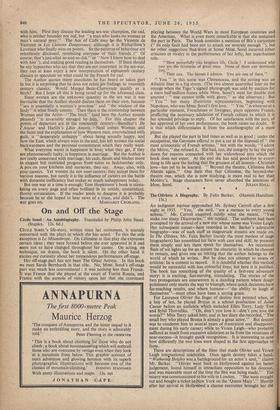On and Off the Stage
Cecile Sorel : An Autobiography. Translated by Philip John Stead. (Staples. 12s. 6d.) actis SOREL'S life-story, written since her retirement, is scarcely concerned with the plays in which she has acted. To this the sole exception is Le Misanthrope. On Celimene in that play she expresses certain ideas ; they were formed before she ever appeared in it and seem not to have changed throughout her career. On acting, on technique, on drama, the book is silent. On the other hand it excites our curiosity about her tremendous performances off-stage.
Her off-stage part has not been The Great Actress. In this book we meet Sarah Bernhardt in that role. No, Mme. Sorel's off-stage part was much less conventional : it was nothing less than France. It was France that she played at the court of Tsarist Russia, and France with the aureole of victory upon her that she continued playing between the World Wars in most European countries and the Americas. What is even more remarkable is that she sustained the part in Paris. The book contains a mention of Bib's caricature (" its only fault had been not to attack me severely enough "), but no other suggestion that even at home Mme. Sorel incurred either criticism or rivalry in the performance of her lofty, her superhuman role.
" How powerfully you heighten life, Cecile ! I understand why you are the favourite of great men. None of them can dominate you."
" They can. The heroes I admire. You are one of them."
" You " in this scene was Clemenceau, and the setting was an Atlantic liner in a big storm. (The two almost quarrelled later on the voyage when the Tiger's signed photograph was sold by auction for a mere half-million francs while Mme. Sorel's went for double that amount : " one cannot trifle with glory," as she observes.) But " You " has many illustrious representatives, beginning with Napoleon, who was Mme. Sorel's first love. " You " is whocvcr•at a particular moment, Frenchman or foreigner, plays opposite France, proffering the necessary adulation of French culture to which it is her splendid privilege to reply. Of her satisfaction with the part, of her approval of her own performance, the book raises no doubt. It is that which differentiates it from the autobiography of a mere player.
But she played the part in bad times as well as in good ; under the occupation, the Germans offered to put a car at the disposal of " the most aristocratic of French artistes," but with the words, " I adore the Metro," she refused it. She had, too, the integrity to lay the part down for reasons connected with her widowhood into which the book does not enter. At the end she has said good-bye to every- thing in life save the feeling that the greatest of all lessons—Christian love—has yet to be learned. " Beyond the theatre, Celimene finds Alceste again." One feels that that Celimene, the beyond-the- theatre one, which she is now studying, is more real to her than Moliere's. Stage characters have never absorbed the attention of Mme. Sorel. JULIAN HALL. * *


































 Previous page
Previous page